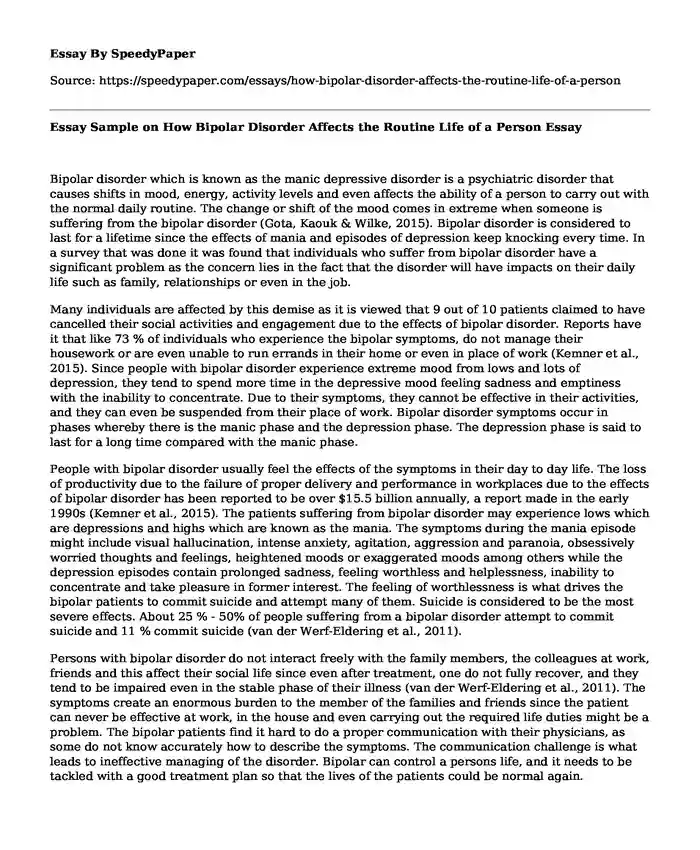
| Type of paper: | Essay |
| Categories: | Psychology Mental health Bipolar disorder |
| Pages: | 3 |
| Wordcount: | 732 words |
Bipolar disorder which is known as the manic depressive disorder is a psychiatric disorder that causes shifts in mood, energy, activity levels and even affects the ability of a person to carry out with the normal daily routine. The change or shift of the mood comes in extreme when someone is suffering from the bipolar disorder (Gota, Kaouk & Wilke, 2015). Bipolar disorder is considered to last for a lifetime since the effects of mania and episodes of depression keep knocking every time. In a survey that was done it was found that individuals who suffer from bipolar disorder have a significant problem as the concern lies in the fact that the disorder will have impacts on their daily life such as family, relationships or even in the job.
Many individuals are affected by this demise as it is viewed that 9 out of 10 patients claimed to have cancelled their social activities and engagement due to the effects of bipolar disorder. Reports have it that like 73 % of individuals who experience the bipolar symptoms, do not manage their housework or are even unable to run errands in their home or even in place of work (Kemner et al., 2015). Since people with bipolar disorder experience extreme mood from lows and lots of depression, they tend to spend more time in the depressive mood feeling sadness and emptiness with the inability to concentrate. Due to their symptoms, they cannot be effective in their activities, and they can even be suspended from their place of work. Bipolar disorder symptoms occur in phases whereby there is the manic phase and the depression phase. The depression phase is said to last for a long time compared with the manic phase.
People with bipolar disorder usually feel the effects of the symptoms in their day to day life. The loss of productivity due to the failure of proper delivery and performance in workplaces due to the effects of bipolar disorder has been reported to be over $15.5 billion annually, a report made in the early 1990s (Kemner et al., 2015). The patients suffering from bipolar disorder may experience lows which are depressions and highs which are known as the mania. The symptoms during the mania episode might include visual hallucination, intense anxiety, agitation, aggression and paranoia, obsessively worried thoughts and feelings, heightened moods or exaggerated moods among others while the depression episodes contain prolonged sadness, feeling worthless and helplessness, inability to concentrate and take pleasure in former interest. The feeling of worthlessness is what drives the bipolar patients to commit suicide and attempt many of them. Suicide is considered to be the most severe effects. About 25 % - 50% of people suffering from a bipolar disorder attempt to commit suicide and 11 % commit suicide (van der Werf-Eldering et al., 2011).
Persons with bipolar disorder do not interact freely with the family members, the colleagues at work, friends and this affect their social life since even after treatment, one do not fully recover, and they tend to be impaired even in the stable phase of their illness (van der Werf-Eldering et al., 2011). The symptoms create an enormous burden to the member of the families and friends since the patient can never be effective at work, in the house and even carrying out the required life duties might be a problem. The bipolar patients find it hard to do a proper communication with their physicians, as some do not know accurately how to describe the symptoms. The communication challenge is what leads to ineffective managing of the disorder. Bipolar can control a persons life, and it needs to be tackled with a good treatment plan so that the lives of the patients could be normal again.
References
Gota, C., Kaouk, S., & Wilke, W. (2015). The impact of depressive and bipolar symptoms on socioeconomic status, core symptoms, function and severity of fibromyalgia. International Journal Of Rheumatic Diseases, n/a-n/a. http://dx.doi.org/10.1111/1756-185x.12603
Kemner, S., Van Haren, N., Bootsman, F., Eijkemans, M., Vonk, R., & van der Schot, A. et al. (2015). The influence of life events on first and recurrent admissions in bipolar disorder. Int J Bipolar Disord, 3(1). http://dx.doi.org/10.1186/s40345-015-0022-4
Van der Werf-Eldering, M., van der Meer, L., Burger, H., Holthausen, E., Nolen, W., & Aleman, A. (2011). Insight in bipolar disorder: associations with cognitive and emotional processing and illness characteristics. Bipolar Disorders, 13(4), 343-354. http://dx.doi.org/10.1111/j.1399-5618.2011.00934.x
Cite this page
Essay Sample on How Bipolar Disorder Affects the Routine Life of a Person. (2019, Aug 30). Retrieved from https://speedypaper.net/essays/how-bipolar-disorder-affects-the-routine-life-of-a-person
Request Removal
If you are the original author of this essay and no longer wish to have it published on the SpeedyPaper website, please click below to request its removal:
- Essay Sample: Trip to Colorado Rockies and Hudson River Valley
- Literary Essay Sample: Hero as Savior
- Free Essay on the Contamination by the Reclaimed Wastewater
- Essay Sample: Obesity Trends in the United States
- Free Essay on Improving Access to Health Care for Those Without Insurance or on Medicaid
- Essay Example on Contracts Containing Lease According to FASB
- Rural Areas: Diversity, Poverty, and Unique Experiences - Paper Example
Popular categories




